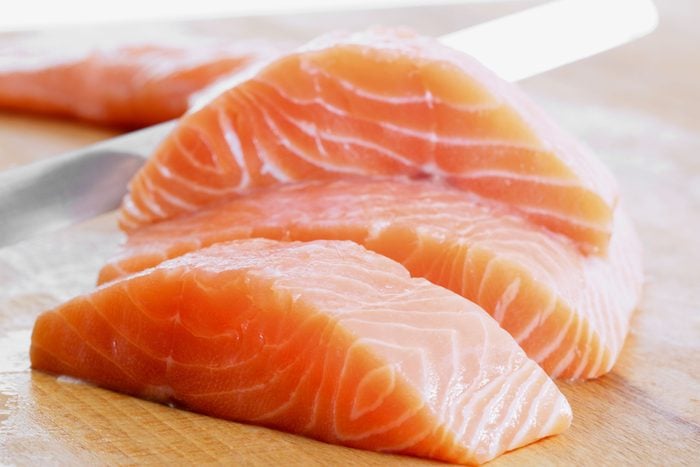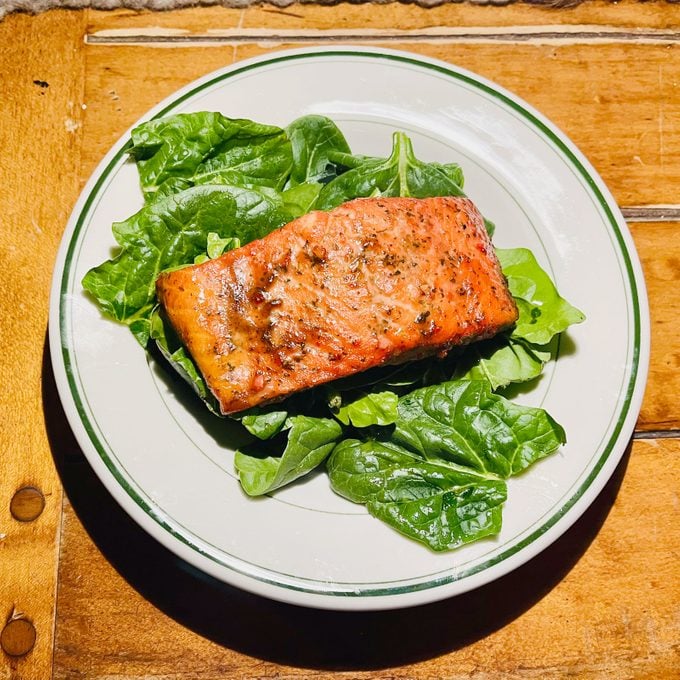I Had Salmon Every Day for a Week—Here’s What Happened
Updated: Apr. 15, 2024

Eating salmon every day might sound excessive, but it turned out to be the all-in-one diet supplement one health reporter needed.
Our editors and experts handpick every product we feature. We may earn a commission from your purchases.
I’m middle-aged and active, so I take fish oils daily to help with aches and pains, as well as to experience the overall benefits of fish oil: it can lower blood pressure, reduce cholesterol, and help ward off heart disease. The Mayo Clinic recommends fish oils for their omega-3 fatty acids, which our bodies use for everything from muscle activity to cell growth.
But what if I stopped taking my fish oil supplements for a week, and ate salmon every day instead?
I Had Oatmeal Every Day for a Week—Here’s What Happened
Heart disease runs on both sides of my family. Doing what I can to prevent it feels like a responsibility, not an option. “In the 1970s, polyunsaturated fat was linked to a lower risk of cardiovascular disease in the Greenlandic Inuit population,” says Melody H. Hermel, MD, a cardiologist in Southern California. “Much research has ensued on the benefits in particular of omega-3 polyunsaturated fatty acids,” Dr. Hermel says. “Fatty fish, such as salmon, is rich in the omega-3 fatty acids EPA and DHA, and meta analysis from 2006 found that consuming 250 to 500 milligrams of EPA and DHA per day led to 36% relative risk reduction of cardiovascular death.”
Salmon is considered to be one of the best sources of omega-3 acids. According to salmonfacts.org, eating them improves brain and eye health, reduces inflammation, and can even assist with weight loss. So would swapping my supplements for salmon for a week have any major effects? I gave it a try—here’s what I discovered.
A Cardiologist Just Opened Her Fridge to Reveal the Heart-Healthy Foods She Eats

Salmon is quick and convenient
It can be too easy to rely on convenience foods that are quick to prepare, but not necessarily the healthiest or most nutritious. I work from home in upstate New York…so during the cold months, I like to stay stocked up on healthy foods that are canned or frozen for those stretches of days when I’m not out braving the weather to get to the store.
So on the first day of this experiment, I opened a can of Scout Smoked Wild Pink Salmon. Scout says their mission is “to become the most trusted seafood brand in North America … By continuing to source from regional partners that meet the highest standards in seafood sustainability, including reduced bycatch and minimal ecosystem impact.”
I mixed my Scout salmon with mayonnaise and pickles to serve on crackers. Scout’s canned salmon is packed in olive oil—and, I was impressed to find, remarkably good-tasting for canned fish.
But I knew I would have to beef up my approach beyond crackers if this experiment was going to last a week, so I also defrosted a package of Secret Island Whiskey Teriyaki Salmon. Of their fish, the Secret Island brand says, “Sustainably sourced from our advanced aquaculture farms in Chilean Patagonia, it’s flash-frozen within hours of harvest for legendary ocean-to-plate quality.” Secret Island’s salmon is certified by Best Aquatic Practices, which means it’s safe, responsible and ethically raised farmed seafood. Their traceability includes animal health and welfare, environmental responsibility, food safety and social accountability. According to the Global Salmon Initiative, sustainable aquaculture is a must if we’re going to feed our constantly growing population, while avoiding overfishing.
I baked my Secret Island salmon at 450 degrees for 13 minutes, and it was perfect. While the salmon cooked, I chopped up some garlic and sauteed a 12-ounce bag of spinach. I didn’t have any other side dishes and was hungry, so I ate two six-ounce salmon servings, leaving me with two servings for the next day. The whole thing was just as easy as making pasta with jar sauce, and I felt much better afterward. In fact, I might have been too energized.
Here’s How Long Leftovers Really Last
Salmon gave me a lot of energy
The U.S. Department of Agriculture (USDA) recommends eight or more ounces of oily fish per week, and I had three times that in one day. Salmon is an excellent source of protein (it contains nine essential amino acids) and is also high in B vitamins, which explains my energy boost.
“The average 3.5-oz. (100-gram) portion of farmed salmon contains 41% of the recommended daily intake of protein and at least 20% of the recommended daily intake of vitamins B3, B5, B6, B12, vitamin D, vitamin E and selenium,” Global Salmon Initiative reports. “It is also a good source of potassium, which is a nutrient of public health concern in the United States.”
After that first day eating the canned salmon and the filets, I was buzzing at 9:00 p.m.—a time of day when I’m usually looking for my bed. The truth is, I didn’t sleep too well that night. I’m not sure if it was the energy from the salmon, the lack of fatigue-inducing carbs, or something unrelated.
10 Ways Your Body Is Telling You You’re Running Low on Key Vitamins
Overall, I felt great
Eating a bigger meal earlier in the day is better for digestion and sleep. So for the rest of the week, I adjusted my days to eat the bulk of my salmon—usually two portions—around 3:00 p.m., and I didn’t have any issues sleeping the rest of the week. Whether it was thanks to the salmon or the mild late-fall weather, but I found myself jogging every day and even increasing my distance.
Eating salmon and veggies did leave me feeling great, but one night it was cold and rainy. I simply craved pasta. I put a few of Butcher Boxes’ wild-caught sockeye salmon filets in the air fryer and served it on top of ZENB yellow-pea penne, which is gluten-free and contains 17 grams of protein and 11 grams of fiber in each three-ounce serving. I added a side of garlicky roasted broccoli and had a well-balanced, satisfying meal.
The Secret Protein Trick Nutritionists Swear by (It’s Not Protein Powder)
Is eating salmon every day sustainable?
This time, I don’t mean “sustainable” from an environmental perspective—though that’s something to consider. I mean, “Should I actually eat salmon every day?”
I posed the question to Gigi Ashworth, also known as The Salmon Queen, who eats eight to 10 pounds of salmon weekly. “Salmon became my go-to food early on, thanks to the fact that I was diagnosed with auto-immune diseases, food allergies and food intolerances that hinder my ability to eat a plethora of foods,” Ashworth told me. “Salmon is a food that I know I can devour and feel no negative repercussions.”
Women’s Autoimmune Diseases: Doctors Share 3 Reasons They’re So Common
I thought about my own energy boost throughout the week, and asked Ashworth to tell me about her experience with this. “Salmon has me energetically bouncing off the walls, as if 600 milligrams of caffeine was dumped down my gullet,” she said, “I kid you not: the question ‘Where do you get all your energy from?’ is one of the most popular questions I get asked regularly, and my response is always, salmon.”
Ashworth told me salmon is one of the only foods that doesn’t cause her to feel bloated, gassy, constipated, tired, or cloudy-headed after eating it. I concur. I hadn’t thought of all those reasons, but once she mentioned them, I realized that a lot of symptoms I typically have after eating—primarily, feeling stuffed and feeling like I need a nap—just didn’t happen during the week I ate salmon every day.
Moving forward, I might not eat salmon every single day, but I’ll eat it several times per week…and I’ll never feel bad about having a second serving.
- Eating This Every Day May Help Fight Dementia, Says New Study
- Constipated? Gasto Doctors List 5 Sneaky Reasons for Constipation
- This Is What Your Hair Color Reveals About Your Health
- ‘Swing Hard In Case You Hit It’: NY Yankees Legend Bernie Williams Shares Lessons from His Family’s Liver Disease Fight
